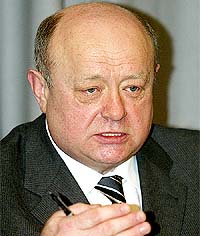
BELGIUM – GAZPROM’S NEXT “HUB” IN EUROPE?
Publication: Eurasia Daily Monitor Volume: 4 Issue: 45
By:

European Union host country Belgium traditionally has been an advocate of EU integration. But its latest actions illustrate the absence of an EU energy policy and the member countries’ growing tendency to strike bilateral energy deals with Russia.
Belgian Prime Minister Guy Verhofstadt, along with cabinet ministers and top private-sector energy executives, paid a working visit on March 2 to Russian President Vladimir Putin in the Kremlin and also to Gazprom’s headquarters. According to Belgian media reports, the press was not invited to accompany the delegation at either meeting in Moscow.
According to Russian news agencies, the delegation explicitly asked for Belgium be selected as a “hub” for the storage and transit of Russian gas in Western Europe. Verhofstadt, a Flemish Liberal, seems to suggest that Gazprom is a liberal market actor like any other. He would have “no objection if Gazprom should decide to acquire infrastructure from the Belgian gas distribution company Distrigaz. … We are structuring the market so as to avoid unhealthy monopolies. Liberalization and diversification are key today, and this does not depend on the presence or absence of Gazprom or any other company,” Verhofstadt told Interfax in Moscow.
The French energy company Suez, controlling owner of Belgium’s Distrigaz, faces a requirement by EU competition authorities to divest itself of Distrigaz as a consequence of the Suez-Gaz de France merger. Thus, parts of Distrigaz will be up for sale and Gazprom is a likely buyer.
The other big distribution company in Belgium, Fluxys, plans to team up with Gazprom to build a large-capacity underground gas storage site at Poederlee for distribution of Russian-delivered gas to Belgium and nearby countries. From the perspective of Gazprom’s expansion plans, Fluxys is attractive due to its direct links with the pipeline networks of several West European countries. Moreover, the project envisages laying a pipeline on the seabed of the North Sea from Zeebrugge in Belgium to Britain for Gazprom.
Belgium currently consumes some 16.5 billion cubic meters of gas annually, all of it imported, mostly from the North Sea basin. Gazprom first entered the Belgian market in 2006 with a small volume that will likely grow rapidly through these projects. Using a tactic it has recently tried in Hungary and Germany, Gazprom offers to make the targeted country a “regional hub” for storage and transit of Russian-delivered gas, demanding portions of the would-be “hub” country’s infrastructure in return for that favor. The offer is dubious because the cession of infrastructure in conjunction with long-term supply contracts would lead to dependency on Gazprom. For his part, Verhofstadt touted Belgium’s geographical position and gas infrastructure as a “gas distribution crossroads” for Europe.
In a parallel deal, Russia’s Lukoil plans to acquire from ConocoPhillips the latter’s network of 156 gasoline service stations in Belgium. This U.S. company holds a stake of some 20% in Lukoil. At present, GazpromNeft — the former Sibneft, acquired last year by Gazprom — is arm-twisting Lukoil to agree to a merger on a parity or 51%-49% basis with GazpromNeft seeking the operating rights in the merged company.
Putin and the Belgian delegation welcomed these projects during their meeting in the Kremlin. On a cautionary note, however, Verhofstadt told the Russian press that interruptions in oil and gas supplies to the West, such as occurred during Russia’s disputes with the transit countries Ukraine and Belarus in 2006-2007, are worrisome to the West and damaging to Russia’s reputation.
Outside the energy sphere, the delegation lobbied for an increase in raw diamond supplies from Russia’s state company Alrosa to Belgium’s diamond-processing center in Antwerp. “We are ready to buy as much as Alrosa can sell,” Verhofstadt said. In Antwerp, the High Council for Diamonds vies with other world diamond-processing centers for Alrosa’s raw product. On the whole, the Belgian visit to Moscow looked like a business-soliciting exercise.
Coinciding with the Belgian visit, on March 2 official indications emerged for the first time that Russia may well face a deficit of gas from 2011 onward. Speaking at a cabinet of ministers’ session, Trade and Economic Development Minister German Gref announced that Gazprom is unable to present an output forecast beyond 2010 for planning purposes, as the company’s experts now “officially state” that shortages are to be expected after that year. Prime Minister Mikhail Fradkov responded that “the situation should not be over dramatized”; and First Deputy Prime Minister Dmitry Medvedev, who is also Gazprom’s board chairman, deferred the presentation of a forecast until the situation with supply contracts in Europe post-2010 becomes clear.
And on that same date, Russia’s Chamber of Accounts criticized Gazprom for under investing in exploration, field development, and infrastructure maintenance in Russia while over investing in acquisitions of other companies, including some outside of the energy sector.
(De Standaard [Brussels], Interfax, Vremya Novostey, March 2)




